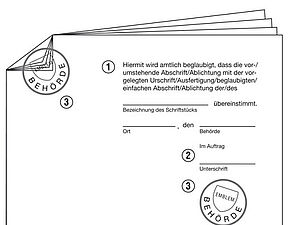You received a study place at the HafenCity University (HCU) and you have to submit for the enrolment a certfied copy of your higher education entrance qualification and/or your academic degree. You will find below information, how copies need to be certified and where you can have your documents certfied.
What is an officially certified copy?
An officially certified copy of a certificate or document is the official confirmation that a copy is identical to the original document. The officially certified copy confirms the authenticity of a certificate or document.
Please note:
If a certified certificate is copied or scanned again, it is no longer certified.
How do copies need to be certified?

Officially certified copies must always contain the following:
- the original official stamp and
- the original signature of the certifying person
Officially certified copies consisting of multiple pages must clearly show that every page has been officially certified in the same process. This can be ensured in the following ways:
- Using the official stamp: The official stamp must be visible on all pages. In order to achieve this, the person who certifies the copy attaches the pages to each other in a staggered arrangement and then stamps them with the official stamp. This results in every page carrying a part of the official stamp. With this method, the certification declaration and signature need to be applied to only one page.
- Using a ribbon and an embossed seal: If a notary attests the copy using a ribbon and an embossed seal, the certification declaration and signature also need to be applied to only one page.
Where can I have my documents certified?
In Germany, any public institution which has an official stamp is authorised to certify documents. This includes:
- town halls / citizen centres,
- "Ortsbürgermeister" (local mayors),
- "Kreisverwaltungen" (local governments),
- parish offices,
- courts,
- notaries.
Outside of Germany, the following institutions may carry out official certifications:
- the issuing schools or universities,
- the ministry of education in your country of origin,
- German embassies and consulates,
- the department of cultural affairs of the embassy of the country in which the certificate was issued,
- public authorities and notaries which are authorised to supply official certifications in your country of origin.



